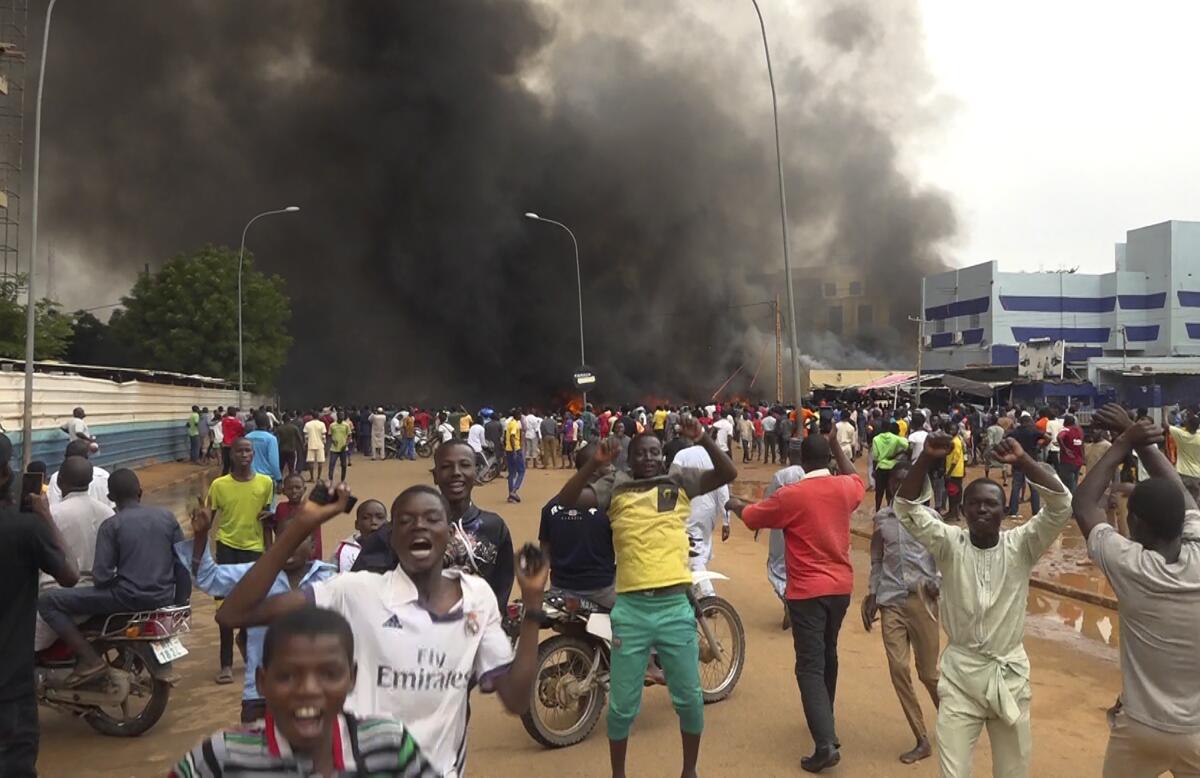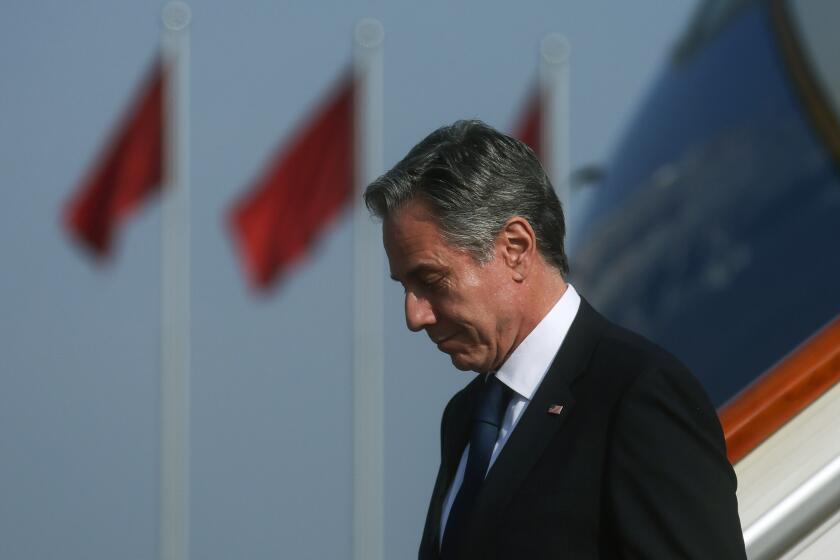U.S. turns up pressure in critical ally Niger as region faces threat from Russia-loyal Wagner Group

- Share via
WASHINGTON — When Niger was rattled by a coup in late July, it was just the latest West African nation to be challenged by mutinous militaries bent on unseating the existing government — what some have called a domino chain of armed takeovers in a sensitive part of the world where Russia-loyalist mercenaries are in ascendance.
But Niger, U.S. officials say, is different.
Niger’s president, Mohamed Bazoum, who is now being held captive by his former security detail, is a rare democratically elected leader who was inaugurated in 2021 in the country’s first peaceful transfer of power. His nation is the recipient of $2 billion in U.S. and other Western aid annually. And more than 1,000 U.S. troops are stationed in Niger, where they train the Nigerien military to battle jihadist terrorist groups active in the area.
The Biden administration and European Union rushed to condemn the coup and have lamented the potential loss of their last reliable West African ally as international pressure continued to mount. Losing Niger could be seen as a victory for Russia, experts say.
Striking a harsh tone like the West, the Economic Community of West African States, or ECOWAS, handed military coup leaders in Niger — led by presidential guard Gen. Abdourahmane Tchiani, who has declared himself head of state — a Sunday deadline to stand down and reinstate Bazoum to office. Though ECOWAS is attempting to broker negotiations, it has said it will use military force if Tchiani does not comply, threatening a wider conflict that would further devastate an impoverished region marred by violence.
U.S. officials do not think ECOWAS will use military force in the near future, nor will they commit to join in, but they have warned that Niger risks collapse as a nation if the attempted coup isn’t halted. And Russia’s notorious militia force, the Wagner Group, is poised to step into the void.
“Let me be very, very clear about this,” said U.S. Secretary of State Antony J. Blinken, who visited Niger in March and has been in regular telephone contact with Bazoum since the July 26 coup. “Our economic and security partnership with Niger — which is significant, hundreds of millions of dollars — depends on the continuation of the democratic governance and constitutional order that has been disrupted. That support is in clear jeopardy.”
Key U.S. posts overseas have been left open while GOP senators have stalled approval of diplomatic nominees and military posts.
Though Niger had, until now, remained a steadfast ally of Washington and the West, it has grown increasingly isolated, a lone island in a sea of countries ruled by military putschists backed by the Wagner Group, a vicious militia with ties to Russian President Vladimir Putin and led by Russian oligarch Yevgeny Prigozhin.
Niger sits in the middle of the Sahel, a thick belt of countries across the widest section of the African continent from Senegal on the Atlantic Ocean westward to Sudan and Eritrea on the Red Sea. U.S. officials say the Sahel has become home to branches of the Islamic State and Al Qaeda terrorist groups.
Nearly all of Niger’s neighboring governments have fallen to military coups in the last five years, while Islamist insurgent violence explodes on its borders with Mali and Burkina Faso, where the Wagner Group has deployed forces to offer protection to leaders while exploiting the countries’ mineral and other natural-resource wealth. To offer itself as an alternative, the Wagner Group has capitalized on anti-colonial sentiment targeting France and the U.S., American officials say. Prigozhin was quick to offer support for the Niger coup, although U.S. officials do not believe he instigated it.
Despite the volatility of the region, U.S. officials said they were surprised by the Niger uprising, which they said may have been prompted when Tchiani thought he was going to be fired as head of the presidential security guard. The U.S. has been without an ambassador in the Nigerien capital, Niamey, while nominee Elizabeth FitzGibbon, a veteran Africa expert in the foreign service and an alumnus of UC Davis, awaited confirmation for a year as a small group of GOP senators held up diplomatic and military appointees to punish the Biden administration.
The New York congresswoman and 10 other progressive Democrats will visit left-leaning Brazil, Chile and Colombia in a challenge to Biden’s policies.
Senior State Department officials still hold out hope that the coup can be reversed, encouraged by the fact that they are able to speak regularly to Bazoum, to former Niger President Mahamadou Issoufou and even to people in Tchianti’s circle. They believe Tchianti has yet to consolidate his control, potentially allowing some military elements to be swayed to restore the democratic system.
And in contrast to revolts in several other countries, the streets in Niamey have remained relatively calm, though the U.S. ordered non-essential personnel at its embassy to leave the country Friday and warned American citizens against any travel to the country.
“So this isn’t an old-style coup that I would have seen [30 years ago], where they line up people and shoot them on the beach,” a senior State Department official said, briefing a small group of reporters in Washington on condition of anonymity to discuss a fluid situation. “We’re far from that, which means [coup leaders] haven’t made up their mind.”
Unlike some others who have been in his position, Bazoum has declared himself a hostage and refused to go quietly — he won’t resign, is penning op-eds in U.S. newspapers and is still the rightful president of the country, even as Tchiani went on Nigerien television to declare himself president.
President Biden observed Niger’s national independence day on Thursday by demanding that Bazoum and his family be released immediately from imprisonment in their residence “for the preservation of Niger’s hard-earned democracy.”
The State Department official speaking on condition of anonymity said it was not likely the crisis will be resolved in days or weeks.
“This could play out over time,” the official said. “But I think ultimately, there’s too much at stake for Niger and the region to let it stand.”
A major danger, the official said, is that although Prigozhin and the Wagner Group may not have had a hand in staging the coup, they will not hesitate to take advantage of it, even though Russia has not had the same kind of influence or presence in Niger that it had in other West African countries.
“They’re very well placed to quickly take advantage of a situation like this,” the official said. “This is an opportunity of a lifetime, the low-hanging fruit that they never thought would fall.”
Another senior State Department official said there was also concern that Bazoum and his family could not be freed from their imprisonment without major risk to their lives.
“We believe the situation is really fluid,” the official said.
John F. Kirby, a White House spokesman, said military intervention by ECOWAS or any other force to rescue Bazoum was a last resort.
“Right now we are focused on diplomacy,” Kirby said. “We still believe there’s time and space for that. But ... the window is not going to be open forever.”
More to Read
Get the L.A. Times Politics newsletter
Deeply reported insights into legislation, politics and policy from Sacramento, Washington and beyond. In your inbox three times per week.
You may occasionally receive promotional content from the Los Angeles Times.













